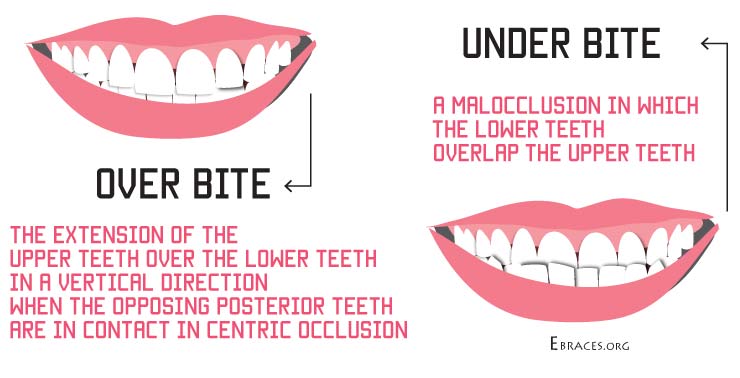Let’s face it. Some people are just born with amazing teeth. Oh, the envy…
Have you seen someone smile at you and instead of smiling back, you’re staring at their straight set of pearly whites, wishing you had what they have? It’s as if they never had to suffer through hideous metal braces as children or face long-term alignment problems.
In fact, we know someone who’s spent 4 years wearing braces only to find that nothing has changed! Oh, the horrors!
Of course, in a perfect world, no one would need braces or orthodontic care. Unfortunately, we don’t live in a perfect world. And if you’re struggling with jaw pain or a bite misalignment, you’re not alone.
The orthodontics field has come a long way from the days of metal braces and dental gear. The good news is now you have even more solutions for achieving the golden smile you’ve always dreamed about.
If your dentist or orthodontist ever said you have a crossbite, underbite or overbite, don’t give yourself a headache wondering what they mean. A normal bite is known as an occlusion while a crossbite, an underbite or an overbite is known as a malocclusion. These types of bites aren’t as scary as they sound and can be fixed with the proper treatment.
Here, let us break it down for you what each type of bite means and how they can be fixed.
Crossbite
A crossbite is when an upper tooth fits behind a lower tooth or vice versa. The upper teeth are meant to overlap the lower teeth a little when you bite down. If it’s just one or two adult teeth that aren’t meeting up properly, it may be due to the way they came in. This can happen sometimes when a baby tooth doesn’t fall out in time for the permanent tooth to come down. If your crossbite involves several teeth, you may be experiencing a narrow or small upper or lower jaw.
How it can be fixed: Crossbites that are caused by a single tooth or two can often be fixed by wearing braces or Invisalign, both of which will move the teeth to their proper places. If your crossbite is caused by a narrow jaw, it may require a palatal expander, a solution that gradually expands the width of the jaw and the teeth will follow within the jawbone.
Underbite

An underbite occurs when your lower teeth go in front of your upper teeth when you bite down. Can’t quite imagine? Think of a bulldog whose lower teeth are in front of its upper ones. While most underbite cases in people aren’t nearly as pronounced, it can still cause irregular tooth wear and cause people to feel self-conscious about their smiles.
How it can be fixed: Underbites can be caused by different factors that require equally different treatments. Mild underbites are often the result of the lower teeth tilting outwards or the upper teeth tilting inwards. This type of underbite may be treated with braces that move the tilted teeth back into their respective places. An undergrowth of the upper jaw or an overgrowth of the lower jaw can also cause underbites which may require braces as well as surgical procedure to one or both jaws.
Overbite
When you close your mouth, having your upper teeth overlap your lower teeth a little is normal. But if they overlap too much, it means you have an overbite. An overbite is the most common type of bite and are often caused by genetics – if you have an overbite, chances are one or both of your parents did too. They also occur when young children use pacifiers for extended periods of time or suck their thumbs as these habits can affect their jaws as they are forming.
How it can be fixed: If your teeth are crowded and causing an overbite, removing a few teeth can give more space for the rest of your front teeth to move back in your upper jaw. Rubber bands properly placed on braces or select appliances can also bring your upper jaw back in line with your lower jaw over time. In extreme cases, especially in adults whose jaws are no longer growing, this can be treated with surgery.
We can totally understand if people want to get their bites fixed simply because they aren’t happy or confident with the way their smiles look. However, these issues aren’t simply for cosmetic reasons. Misaligned teeth can cause unusual wear, chewing difficulties, and jaw pain if left untreated. While it is often easier to change a child’s bite because their jaws are still growing, there are many effective treatments for adults as well.

If you think you or your child has a crossbite, underbite, overbite, or any other bite issue (image above), please see your dentist or orthodontist about it. Alternatively, you can check in with any of the dental professionals at Artius Dental Group for advice and information.
